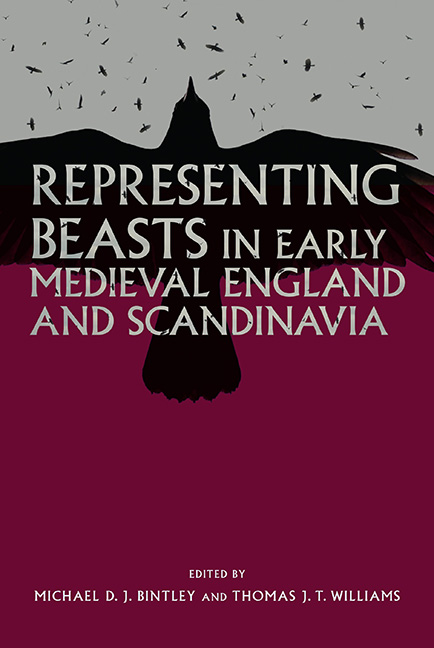Book contents
- Frontmatter
- Contents
- List of Figures and Tables
- Acknowledgements
- List of Contributors
- List of Abbreviations
- Introduction
- 1 Between Myth and Reality: Hunter and Prey in Early Anglo-Saxon Art
- 2 ‘(Swinger of) the Serpent of Wounds’: Swords and Snakes in the Viking Mind
- 3 Wreoþenhilt ond wyrmfah: Confronting Serpents in Beowulf and Beyond
- 4 The Ravens on the Lejre Throne: Avian Identifiers, Odin at Home, Farm Ravens
- 5 Beowulf’s Blithe-Hearted Raven
- 6 Do Anglo-Saxons Dream of Exotic Sheep?
- 7 You Sexy Beast: The Pig in a Villa in Vandalic North Africa, and Boar-Cults in Old Germanic Heathendom
- 8 ‘For the Sake of Bravado in the Wilderness’: Confronting the Bestial in Anglo-Saxon Warfare
- 9 Where the Wild Things Are in Old English Poetry
- 10 Entomological Etymologies: Creepy-Crawlies in English Place-Names
- 11 Beasts, Birds and Other Creatures in Pre-Conquest Charters and Place-Names in England
- Index
- Anglo-Saxon Studies
11 - Beasts, Birds and Other Creatures in Pre-Conquest Charters and Place-Names in England
Published online by Cambridge University Press: 11 June 2021
- Frontmatter
- Contents
- List of Figures and Tables
- Acknowledgements
- List of Contributors
- List of Abbreviations
- Introduction
- 1 Between Myth and Reality: Hunter and Prey in Early Anglo-Saxon Art
- 2 ‘(Swinger of) the Serpent of Wounds’: Swords and Snakes in the Viking Mind
- 3 Wreoþenhilt ond wyrmfah: Confronting Serpents in Beowulf and Beyond
- 4 The Ravens on the Lejre Throne: Avian Identifiers, Odin at Home, Farm Ravens
- 5 Beowulf’s Blithe-Hearted Raven
- 6 Do Anglo-Saxons Dream of Exotic Sheep?
- 7 You Sexy Beast: The Pig in a Villa in Vandalic North Africa, and Boar-Cults in Old Germanic Heathendom
- 8 ‘For the Sake of Bravado in the Wilderness’: Confronting the Bestial in Anglo-Saxon Warfare
- 9 Where the Wild Things Are in Old English Poetry
- 10 Entomological Etymologies: Creepy-Crawlies in English Place-Names
- 11 Beasts, Birds and Other Creatures in Pre-Conquest Charters and Place-Names in England
- Index
- Anglo-Saxon Studies
Summary
There are occasional references to the creatures of legend and folklore in the names of places and boundary landmarks, but in general these sources seem to reveal a close local knowledge of the place being described, especially in pre-Conquest boundary clauses. While the material can be difficult to handle, given uncertainties of translation, and confusion surrounding Anglo-Saxon personal names and some locally known names for particular trees, names referring to animals can reveal much about the concerns of those living in early medieval England. Domestic stock such as pigs, cattle, horses and sheep are noted, and details of animal husbandry are revealed. Terms used for cattle, sheep or horses, for instance, may indicate how they were managed; names may show the location of stalls, byres, and studfolds, or elaborate upon the use of seasonal pastures. The animals of the hunt regularly appear in some regions, and many other wild creatures are noted in particular locations. Even birds are frequently named in both place-names and charters. Some charter boundary clauses are particularly rich in animal and bird names. Importantly, such names provide an intimate view of how local people viewed their countryside.
Mythological Creatures
There is a great deal of information about mythological creatures in Old English literary sources but, on the whole, Anglo-Saxon charters and place-names are very much more down to earth. Monsters do appear, but they seem to be more often mythical ‘humanoid-beasts’ rather than ‘animal-beasts’. Giants and goblins may be associated with pits – like the þyrspytt on the boundary of Poden, Worcestershire – or barrows: a scuccanhlau, ‘demon's or goblin's barrow’, occurs as an early name for Warren Farm in Buckinghamshire, while Shobrooke in Devon is ‘demon's brook’ or ‘haunted brook’. An ‘elf's seat’ (on elfaledes) is referred to on the boundary of Corse, Gloucestershire, while brogan gate in Wytham, North and South Hinksey, Berkshire, may be ‘monster/terror gate’. The belief in pits, meres or ponds providing a link with the underworld finds expression, of course, in the popular Anglo-Saxon poem Beowulf, and a sprinkling of minor place-names recorded in charters seem to refer to this and especially to the monster Grendel, ‘a notorious prowler of the borderlands, who held the wastelands, swamps and fastness’. He is associated, for instance, with a pit in Abbot's Morton, Worcestershire, with an unlocated mere in Old Swinford in the same county, and another at Ham, Wiltshire.
- Type
- Chapter
- Information
- Representing Beasts in Early Medieval England and Scandinavia , pp. 253 - 282Publisher: Boydell & BrewerPrint publication year: 2015
- 2
- Cited by



